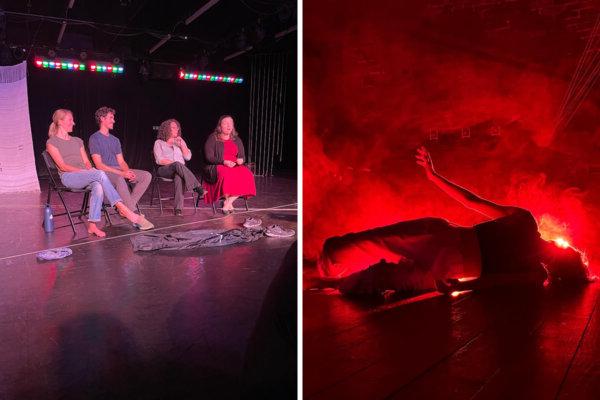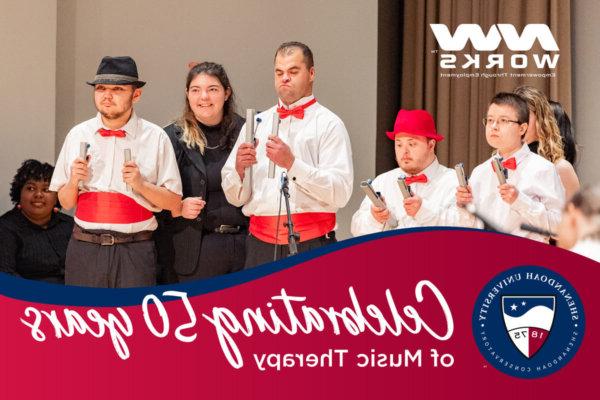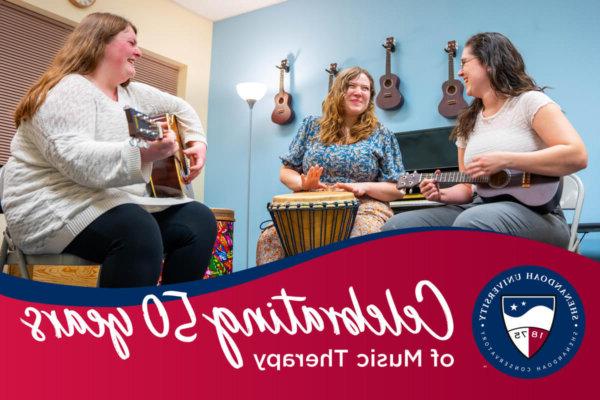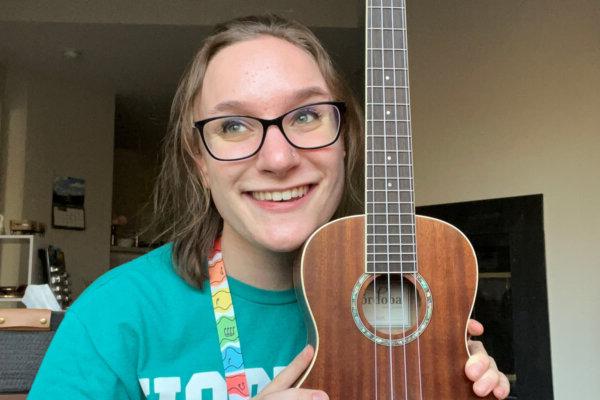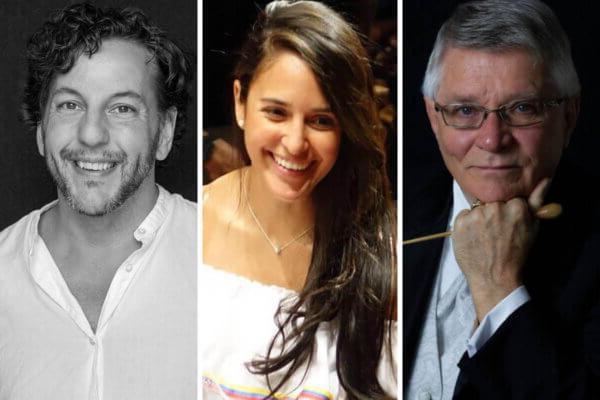Let your passion for music serve others.
Shenandoah’s Professional Studies Program for Music Therapy Certification Eligibility is perfect for you, if you have a bachelor’s degree, skills as a musician, and an interest in working with people. Our full-time, two-year professional studies program allows you to develop your skills and clinical expertise in a supportive, creative learning environment at the oldest music therapy degree program in Virginia. Our comprehensive course of graduate-level study (39 credits) is for people like you, who hold an undergraduate degree in music or a related field (e.g. music education, psychology, liberal studies, etc.) and wish to become Board Certified Music Therapists (MT-BC). You’ll meet for classes two days a week, work in small cohorts and gain plenty of hands-on experience in the program, which includes a full-time internship.
Looking to learn more?
Start a conversation with us — just send me an email.
Dr. Tony Meadows | ameadows2@mblayst.com
Learn More About This Program
Music therapy helps clients to develop skills, adapt behavior, and overcome obstacles in their lives. Music therapists use different kinds of musical experiences, such as singing, improvising, songwriting, and listening to and talking about music, to meet clients’ needs using the unique relationship between client, music and therapist. Music therapists are creative, compassionate, thoughtful people.
Music therapy is goal directed, and music therapists learn skills in the assessment-treatment-evaluation process that allows them to work effectively with clients. Depending on the setting, you work as part of a clinical team, alongside colleagues such as doctors, nurses, teachers, and physical therapists.
Music therapists work in a wide variety of setting that includes schools, hospitals, mental health facilities, nursing homes and hospice. Some settings, like nursing homes, tend to emphasis group work, whereas other settings, like hospitals and hospice, tend to emphasize individual work.
What is a board certified music therapist?
A board certified music therapist (MT-BC) is an individual who has successfully completed the nationally accredited Board Certification exam, demonstrating the knowledge, skills and abilities necessary to practice professionally.
I joined the professional studies program because of Shenandoah University’s reputation for music therapy education. I have a passion for working with older adults, so working in a long-term care facility as a music therapist is my dream job.”
Valerie Jackson ’12, ’16, ’19 | Bachelor of Music in Performance, Certificate in Music Therapy, Master of Music Therapy
To learn more about the Professional Studies Program, or if you have questions about your eligibility for the program, please feel free to contact Dr. Meadows directly at ameadows2@mblayst.com.
Internship Possibilities
Students complete a 6-month full-time clinical placement in which they work directly and intensively with clients, under the supervision of a music therapist. Through mentorship, students are guided into a setting of interest (e.g. hospital) and supported by faculty through the application process, remaining in contact with faculty throughout internship.
Students have the opportunity to participate in international music therapy cultural programs arranged through the Shenandoah Conservatory and approved programs outside of the Conservatory such as the Jamaica Field Service Project.
Career and Salary Possibilities
Students who complete this program, and pass the board certification exam, work as clinical music therapists in a range of settings, including schools, hospitals, mental health facilities, hospice and private practice.
The American Music Therapy Association (AMTA) provides annual salary data for music therapists, updated each year and available online for review. In their 2015 analysis, the average salary for professionals with a Bachelor’s degree was $46,740.00. Music therapists with a Master’s degree earned, on average, $55,019.00. The average music therapy salary in Virginia was $52,263.00.
Classes
Working in classes of 8-12 students, we combine theory and research with hands-on practical knowledge and skills. You work on assignments that develop your understanding of how to implement music therapy activities and experiences, and how to understand the complex needs of clients.
An interdisciplinary focus is included. Currently, 2nd year students participate in case reviews with graduate nursing students, focused on assessing and developing treatment plans for adults with mental health concerns. These kinds of collaborations build teamwork and increase student’s understanding of a music therapist’s role in interdisciplinary care.
View Full Music Therapy Curriculum
Here are examples of courses you will take:
MUTH 524 Performing Therapy: An Experiential Orientation gives students an experiential understanding of music therapy by writing and performing original song and musical materials that speaks to important life experiences that shape who each student is. By meeting with and working with children and adults who have learning differences, students learn from and incorporate their understanding of therapy and difference into their developing understanding of music therapy clinical practice.
MUTH 531 Psychology of Music takes students through important theories and research related to music therapy clinical practice. Students explore the neurobiology and neuroscience of music, music as a cultural phenomenon, and integrate current research into their clinical thinking.
MUTH 536 Medical Music Therapy drawing on biopsychosocial theories, students learn a wide range of music therapy practices for children and adults in medical settings. This includes methods that focus on pain management, reducing stress and anxiety, and dealing directly with the psychological distress experienced alongside a medical diagnosis. Students also complete a placement in a medical setting that helps develop these skills.
MUTH 583 Music Therapy Internship Students complete a 6-month full- time clinical placement in which they work directly and intensively with clients, under the supervision of a music therapist. Through mentorship, students are guided into a setting of interest (e.g. hospital) and supported by faculty through the application process, remaining in contact with faculty throughout internship.
Board Certification & State Licensure
The Professional Studies Program in Music Therapy Certification Eligibility is a graduate program intended for students who plan to work as a Board Certified Music Therapist (MT-BC). Students complete courses in music therapy, clinical foundations, clinical musicianship, and 1,200 hours of clinical training in order to be eligible for the board certification exam, which is administered by the Certification Board for Music Therapists (CBMT). Students apply for the board certification exam after successfully completing all academic and internship requirements, including any foundational music courses identified by the Director of Music Therapy during the interview/audition process. CBMT administers the board certification exam, which is undertaken by students independently of their studies at Shenandoah University.
All professional studies students complete three practicum experiences during their studies, and then undertake a six-month internship after competing all required coursework in the program (1200 hours of clinical practice). Students apply to and are accepted into an internship by the clinical training site, and are not guaranteed an internship when they enter the program. Rather, students apply to multiple internship sites and choose an internship based upon their acceptance into these sites. While every effort is made to support students so they may begin internship in their 4th semester of their program, students are occasionally delayed starting internship because of the site start date for their internship.
The MT-BC credential is a national credential recognized by the state of Virginia. While nationally recognized, some states also require a license to practice. Students should consult with the American Music Therapy Association website for specific information on state licensure and recognition requirements should they wish to practice in another state at www.musictherapy.org/policy/stateadvocacy. Currently, the following states require a license to practice: Georgia, Nevada, North Dakota, Oklahoma and Oregon. Utah maintains state certification, while Connecticut and Wisconsin maintain a registry.
Contact Dr. Anthony Meadows, Director of Music Therapy, at ameadows2@mblayst.com if you have additional questions. You may also call (540) 665 4583.
Faculty
The Music Therapy program has three full-time faculty, four part-time faculty, and a number of guest speakers.
Dr. Tony Meadows, MT-BC, LPC, FAMI, is Director of Graduate Studies, advises all graduate students, and teaches the majority of the MMT program. He is a GIM Fellow, completing Analytical Music Therapy training, and has more than 20 years of clinical experience. Dr. Meadows has published extensively in the field.
Bronwen Landless, M.M.T., MT-BC, has more than a decade of experience working in adolescent mental health, which she has expanded into a community music therapy model for people experiencing homelessness. Bronwen has presented at national and international conferences and she serves as the North America Regional Liaison for the World Federation of Music Therapy.
Dr. Hakeem Leonard, MT-BC, teaches in both the undergraduate and graduate programs, and has worked with a wide variety of clients. He has specific expertise in music therapy business practices, and multicultural awareness.
Application and Audition Information
Admission to Shenandoah Conservatory graduate programs is highly competitive and the audition schedule fills rapidly. Early application and audition registration is recommended.
Conservatory Graduate Application Information
Applicants must have a have completed an undergraduate degree in music or a related field (e.g. music education, psychology, etc.), with a minimum grade point average of 3.0 (on a 4.0 scale). Students interested in applying to the program who do not have a music degree are encouraged to contact Dr. Meadows at ameadows2@mblayst.com to discuss music core requirements. After applying, you must arrange an audition by emailing Dr. Meadows at ameadows2@mblayst.com. In order to be admitted into the graduate music therapy program, you must be admitted into the Shenandoah Conservatory and pass the audition/interview.
The audition is one hour and divided into two parts. In the first part, you perform one piece on your primary instrument (that reflects your skills) and a total of four songs on piano and guitar (two each), in which you sing and play. Choose a range of styles that reflect your interests and skills, including children’s songs, pop, folk, show, jazz, blues and “oldies.”
In the second part of the audition, you will be asked a range of questions about your interest in music therapy, your background experiences, goals and general knowledge of the field. You will also be given the opportunity to ask questions about the program.
Please note that the piece you perform on your primary instrument should reflect your musical training. Typically, this means performing a piece from your undergraduate studies (and/or current training), from either the classical or jazz tradition. This piece does not need to be memorized, and for vocalists, an accompanist is not provided. Vocalists may bring an accompanist, a recording to provide accompaniment, or sing acapella.
Scheduling An Audition
Auditions can be arranged in one of two ways. For applicants who live close to campus, auditions are scheduled on campus during the week, or selective weekends in the spring semester. Typically, students will meet with Dr. Meadows in Ruebush 216, in the main conservatory building. On-campus parking is free, and generally readily available.
Students living more than 150 miles from campus can elect a virtual interview. These are arranged directly with Dr. Meadows and can be scheduled most days of the week, pending availability.
Gainful Employment Information
| Job Title | Cohort Number of graduates | Number of Students Graduated On Time | On Time Graduation Rate |
|---|---|---|---|
| Music Therapist | 8 | 8 | 100% |
| Length of Program | Credits | Credit Hour Average Tuition | Program Tuition |
|---|---|---|---|
| 2 years | 39 | $500.00 | Approximately $22,035 plus professional core, music skills lessons and conservatory fees* |
*Students also need to complete up to an additional 15 professional core credits and take up to three semesters of piano, guitar and voice lessons, depending on skill level.
| Books $45 per credit/Supplies | Program Median Loan Debt |
|---|---|
| $1,350.00 | 0 |
Qualities Of Good Music Therapists
Students who come into our graduate music therapy program are looking to combine their love of music with a desire to help others. They can be music therapists (MT-BC) seeking to advance their knowledge of theory, research and clinical practice or students with an undergraduate degree in music or a related field seeking to enter the field of music therapy. Both are typically interested in psychology and may also be interested in medicine and/or philosophy.
Being intellectually curious is very important. Having the desire to open yourself to new concepts, theories and ideas is essential in your development as a music therapist, as are your writing and critical thinking abilities.
Being a competent musician is also very important. Understanding how to reach others through singing and playing, improvising and moving to music means that you need to be well rounded musically. During your training you develop guitar, piano and vocal skills in a range of styles such as rock, folk, country, oldies, children’s songs and sometimes even your own compositions.
Finally, being in good mental and physical health is very important. In order to help others, you need the motivation, maturity and creativity to work with people who have a wide range of needs. This means growing and adapting to different settings and people, being open to supervision and feedback, and having the emotional capacity to “be there” for someone else. The best therapists are often those people who have used music to help or heal themselves—they know first-hand what it’s like to use music therapeutically, and what it’s like to overcome life’s challenges.
